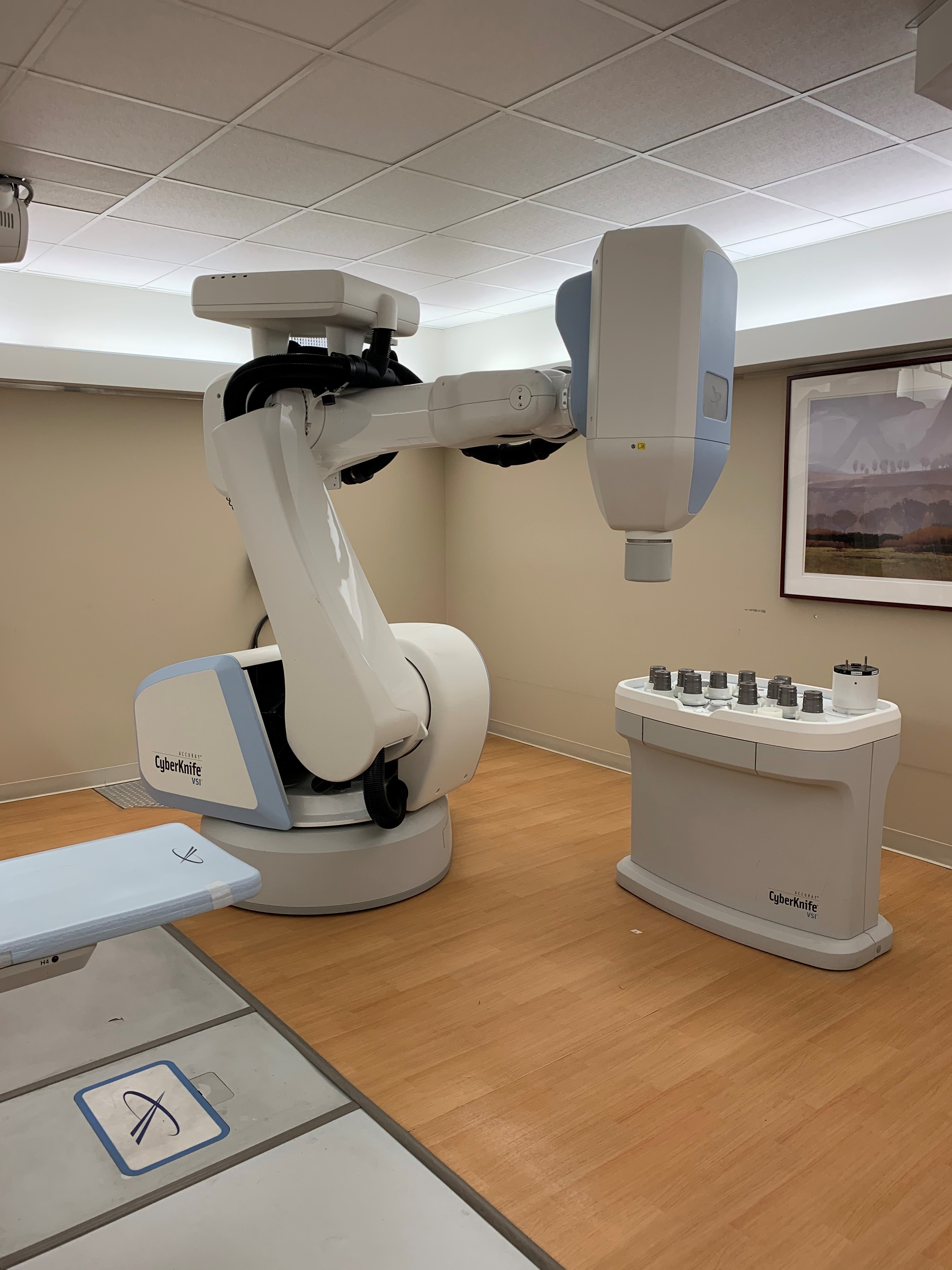
Cyberknife for Prostate Cancer
What is Cyberknife?
Cyberknife is a treatment using external beam radiation. It is the brand name of a machine that delivers stereotactic radiation therapy or "radiosurgery" (SRS) and stereotactic body radiation therapy (SBRT). Despite the name, Cyberknife does not involve a knife, cutting, surgery, or anesthesia for treatment. It uses a linear accelerator (a machine that makes radiation) on a robotic arm that delivers the radiation beam from thousands of directions. Cyberknife uses real-time image-guided radiotherapy (IGRT) to treat tumors in different parts of the body, including the prostate. This means that the motion of the tumor is tracked, and the radiation can be given accurately based on the motion of the tumor.
What can I expect with Cyberknife treatment?
The typical steps for Cyberknife treatment are:
- You will have gold markers, known as "fiducials", placed in your prostate as a way of marking the target or treatment area. The markers will be used to track the tumor position during treatment. You may also have SpaceOAR hydrogel placed to push your rectum away from your prostate. The fiducials and SpaceOAR are done under ultrasound guidance, like a prostate biopsy procedure.
- After your fiducials and SpaceOAR have been placed, a CT simulation will be done. During this CT scan, you will be positioned in the same way you will be positioned during the actual treatments. An MRI or PET may also be needed to give your provider a better picture of your prostate. These scans are used to create your treatment plan.
- While you are being treated, the machine takes pictures of the tumor, which are compared in real-time to the images from the CT simulation. The CyberKnife robot moves around you to deliver precise treatment that can be adjusted as the prostate moves when you breathe. Treatment takes between 30 and 90 minutes (larger tumors take longer to treat than smaller ones).
Why use Cyberknife for prostate cancer?
Cyberknife may be a good option for you if you have prostate cancer because:
- The number of treatments (called fractions) and the amount of radiation (dose) you will get can vary per fraction. Each fraction is a higher radiation dose than is used with traditional radiation, but less fractions are given. Often, treatments include:
- 4 or 5 fractions compared to 30-40 fractions for traditional radiation.
- Treatment is given over 1-2 weeks compared to 8-10 weeks.
- The total dose is in the mid to high 30 Gray range.
- Less radiation to normal tissue.
- It is more accurate than traditional radiation.
- There may be fewer side effects.
- Treatment is done as an outpatient procedure.
In addition, prostate cancer is often a slower-growing tumor. Because prostate cancer cells are growing slowly, they may be more sensitive to higher doses of radiation per fraction than other cancers. This means delivering radiation in larger doses in fewer treatment sessions may improve outcomes.
Who can get Cyberknife treatment?
Along with your health, age, and lifestyle, you may be a candidate for Cyberknife if your diagnosis is:
- Early-stage disease.
- Localized disease (confined to the prostate).
- A prostate volume (size) of less than 80-100 cm.
- A lesion or tumor that is untreatable by surgery or other types of radiation.
Some people with enlarged prostates may be given hormone therapy to try to shrink the prostate so they can get Cyberknife treatment. Patients who are at high risk for spread to the lymph nodes or have cancer in the lymph nodes are not good candidates for Cyberknife.
What are the side effects of Cyberknife?
Side effects are like those with conventional fractionated radiation therapy. The side effects may include:
- Urinary irritation symptoms like:
- Urgency.
- Frequency.
- Bleeding.
- Burning with urination.
- Rectal irritation symptoms like:
- Constipation.
- Hemorrhoids.
- Bleeding or blood in your stool.
- Erectile dysfunction.
- Fatigue.
These side effects are often minimal and only last a short time. Ask your provider about side effects specific to your radiation treatment plan.
OncoLink is designed for educational purposes only and is not engaged in rendering medical advice or professional services. The information provided through OncoLink should not be used for diagnosing or treating a health problem or a disease. It is not a substitute for professional care. If you have or suspect you may have a health problem or have questions or concerns about the medication that you have been prescribed, you should consult your health care provider.
Information Provided By: www.oncolink.org | © 2025 Trustees of The University of Pennsylvania
